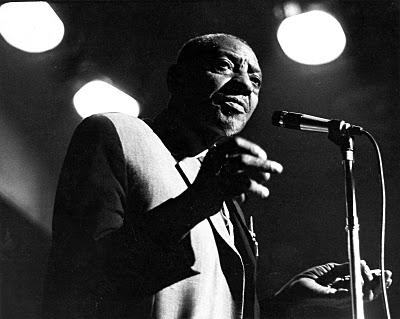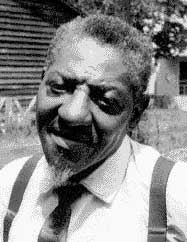<Back to Index>
- Physicist Cecil Frank Powell, 1903
- Bluesman Sonny Boy Williamson II, 1899
- Pope (Il Papa Guerriero) Julius II (Giuliano della Rovere), 1443
PAGE SPONSOR
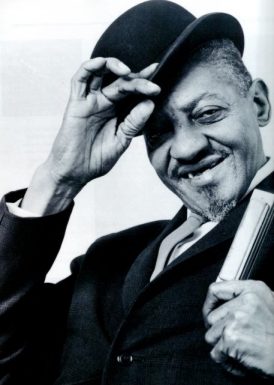
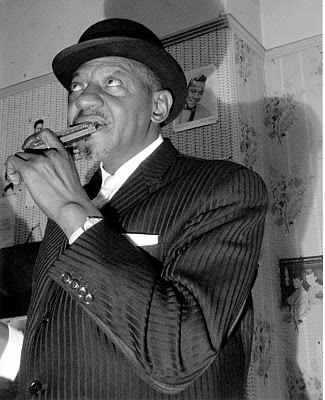
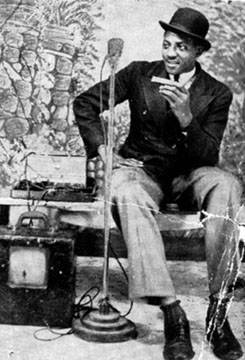
Aleck "Rice" Miller (December 5, 1899? – May 25, 1965) was an American blues harmonica player, singer and songwriter. He was also known as Sonny Boy Williamson II, Sonny Boy Williams, Willie Williamson, Willie Miller, Little Boy Blue, The Goat and Footsie.
Born as Aleck Ford on the Sara Jones Plantation in Tallahatchie County, Mississippi, his date and year of birth are a matter of uncertainty. He claimed to have been born on December 5, 1899, but one researcher, David Evans, claims to have found census record evidence that he was born around 1912. His gravestone lists his date of birth as March 11, 1908.
He lived and worked with his sharecropper stepfather, Jim Miller, whose last name he soon adopted, and mother, Millie Ford, until the early 1930s. Beginning in the 1930s, he traveled around Mississippi and Arkansas and encountered Big Joe Williams, Elmore James and Robert Lockwood, Jr., also known as Robert Junior Lockwood, who would play guitar on his later Checker Records sides. He was also associated with Robert Johnson during this period. Miller developed his style and raffish stage persona during these years. Willie Dixon recalled seeing Lockwood and Miller playing for tips in Greenville, Mississippi, in the 1930s. He entertained audiences with novelties such as inserting one end of the harmonica into his mouth and playing with no hands.
In 1941 Miller was hired to play the King Biscuit Time show, advertising the King Biscuit brand of baking flour on radio station KFFA in Helena, Arkansas, with Lockwood.
It
was at this point that the radio program's sponsor, Max Moore, began
billing Miller as Sonny Boy Williamson, apparently in an attempt to
capitalize on the fame of the well known Chicago based harmonica player
and singer John Lee Williamson (see Sonny Boy Williamson I).
Although John Lee Williamson was a major blues star who had already
released dozens of successful and widely influential records under the
name "Sonny Boy Williamson" from 1937 onward, Aleck Miller would later
claim to have been the first to use the name, and some blues scholars
believe that Miller's assertion he was born in 1899 was a ruse to
convince audiences he was old enough to have used the name before John
Lee Williamson, who was born in 1914. (This is made somewhat less
likely, however, by the fact that Miller was certainly older than
Williamson even if one does not accept the 1899 birthdate.) Whatever the
methodology, Miller became commonly known as "Sonny Boy Williamson,"
(universally distinguished by blues fans and musicians as "Sonny Boy
Williamson number two" or "Sonny Boy Williamson the second") and Lockwood and the rest of his band were billed as the King Biscuit Boys.
In 1949 he relocated to West Memphis, Arkansas, and lived with his sister and her husband, Howlin' Wolf. (Later, for Checker Records, he did a parody of Howlin' Wolf entitled "Like Wolf.") Sonny Boy started his own KWEM radio show from 1948 to 1950 selling the elixir Hadacol.
Sonny Boy also brought his King Biscuit musician friends to West Memphis, Elmore James, Houston Stackhouse, Arthur "Big Boy" Crudup, Robert Nighthawk and others to perform on KWEM Radio.
In the 1940s Williamson married Mattie Gordon, who remained his wife until his death.
Trumpet Records Williamson's first recording session took place in 1951 for Lillian McMurry of Jackson, Mississippi's Trumpet Records (three years after the death of John Lee Williamson, which for the first time allowed some legitimacy to Miller's carefully worded claim to being "the one and only Sonny Boy Williamson".) McMurry later erected Williamson's headstone, near Tutwiler, Mississippi, in 1977.
Chess Records When Trumpet went bankrupt in 1955, Sonny Boy's recording contract was yielded to its creditors, who sold it to Chess Records in Chicago, Illinois. Sonny Boy had begun developing a following in Chicago beginning in 1953, when he appeared there as a member of Elmore James's band. It was during his Chess years that he enjoyed his greatest
success and acclaim, recording about 70 songs for Chess subsidiary Checker Records from 1955 to 1964. Sonny Boy's first LP record was titled Down and Out Blues and was released by Checker Records in 1959.
In the early 1960s he toured Europe several times during the height of the British blues craze (American Folk Blues Festival), recording with The Yardbirds (album: Sonny Boy Williamson and The Yardbirds) and The Animals, and appearing on several TV broadcasts throughout Europe. During this time Sonny was quoted as saying, " those British boys want to play the blues real bad, and they do". According to the Led Zeppelin biography Hammer of the Gods, while in England Sonny Boy set his hotel room on fire while trying to cook a rabbit in a coffee percolator. The book also maintains that future Led Zeppelin vocalist Robert Plant purloined one of the bluesman's harmonicas at one of these shows as well. Robert Palmer's "Deep Blues" mentions that during this tour he allegedly stabbed a man during a street fight and left the country abruptly.
Sonny
Boy took a liking to the European fans, and while there had a
custom made, two tone suit tailored personally for him, along with a
bowler hat, matching umbrella, and an attaché case for his
harmonicas. He appears credited as "Big Skol" on Roland Kirk's live album Kirk in Copenhagen (1963). One of his final recordings from England, in 1964, featured him singing "I'm Trying To Make London My Home" with Hubert Sumlin providing
the guitar. Due to his many years of relating convoluted, highly
fictionalized accounts of his life to friends and family, upon his
return to the Delta, some expressed disbelief upon hearing of Sonny
Boy's touring across the Atlantic, visiting Europe, seeing the Eiffel
Tower, Big Ben, and other landmarks, and recording there.
Upon his return to the U.S., he resumed playing the King Biscuit Time show on KFFA, and performed in the Helena, Arkansas, area. As fellow musicians Houston Stackhouse and Peck Curtis waited at the KFFA studios for Williamson on May 25, 1965, the 12:15 broadcast time was closing in and Sonny Boy was nowhere in sight. Peck left the radio station to locate Williamson, and discovered his body in bed at the rooming house where he had been staying, dead of an apparent heart attack suffered in his sleep the night before.
Williamson is buried on New Africa Rd. just outside Tutwiler, Mississippi, at the site of the former Whitman Chapel cemetery. His headstone was provided by Mrs. Lillian McMurry, owner of Trumpet Records.
Some of his better known songs include "Don't Start Me To Talkin'"
(his only major hit, it reached the #3 position on the national
Billboard R&B charts in 1955),"Fattenin' Frogs for Snakes", "Keep It
To Yourself", "Your Funeral and My Trial", "Bye Bye Bird", "Nine Below
Zero", "Help Me", "Checkin' Up on My Baby", and the infamous "Little Village", with dialogue 'unsuitable for airplay' with Leonard Chess. His song "Eyesight to the Blind" was performed by The Who as a key song in their rock opera Tommy (the only song in that opus not written by a band member) and it was later covered on the Aerosmith album Honkin' on Bobo. His "One Way Out", reworked from Elmore James and recorded twice in the early 1960s, became popularized by The Allman Brothers Band in the early 1970s. In interviews in The Last Waltz, roots rockers The Band recount
jamming with Miller prior to their initial fame as Bob Dylan's electric
backing band, and making never realized plans to become his backing
band. Many of his most famous recordings appeared on The Essential Sonny Boy Williamson and His Best.
While tall tales, unlikely fables and outright lies make up much of what Sonny Boy Williamson II had to say about his own life, his most important contributions have been documented well through countless recordings on myriad labels. His output of recordings, both issued and unissued, for Lillian McMurray's Trumpet label, can be found on Arhoolie, Alligator, Purple Pyramid, Collectables, plus a handful of other domestic and import imprints, while his years as a resident of the Chess / Checker house appear on various compilations on MCA / Chess. His European recordings reside on Alligator, Analogue Productions, Storyville, and others.
Sonny Boy Williamson II has had an influence on modern day blues and blues rock artists, as is shown by the number of his songs that are still covered, including:
- Mick Jagger and Keith Richards formed a band called Little Boy Blue and The Blue Boys in 1962, which after meeting harmonica virtuoso and slide guitarist Brian Jones, would develop into The Rolling Stones. Brian Jones' harmonica playing is directly derived from Williamson.
- Muddy Waters – "Nine Below Zero"
- Canned Heat – "Nine Below Zero" and "Help Me"
- Junior Wells – "Help Me"
- Howlin' Wolf – "Cool Disposition"
- B. B. King – "Eyesight to the Blind"
- Mose Allison – "Eyesight to the Blind"
- John Mayall's Bluesbreakers – "Help Me", "Checkin' Up on My Baby"
- Led Zeppelin – "Bring It On Home"
- Van Morrison – "Take Your Hands Out of My Pocket", "Help Me" – both on the 1974 live album It's Too Late to Stop Now. Morrison has often sung "Help Me" in live performances throughout his long career.
- The Allman Brothers Band – "One Way Out"
- New York Dolls – "Don't Start me Talkin'"
- Ten Years After – "Help Me"
- The Who – "Eyesight to the Blind"
- Aerosmith – "Eyesight to the Blind"
- Gary Moore – "Eyesight to the Blind"
- The Blues Brothers – "From the Bottom"
- Lester Butler – "I Cross My Heart"
- Rory Gallagher – "My Baby, She Left Me", and "Don't Start me Talkin"; on the Defender album and the live bootleg, Meeting With The G-Man.
- Nine Below Zero took their band name from his song.
- The Downchild Blues Band, also known as "Downchild", took their name from his song, "Mister Downchild".
- John Popper of Blues Traveler notes Sonny Boy Williamson as a strong influence on his harmonica playing.
- Joe Bonamassa – "Your Funeral and My Trial"
- Dr. Feelgood – "Checking Up On My Baby" on their live album, Stupidity
- The Doobie Brothers – "Don't Start Me To Talkin'" from their album "Toulouse Street"
